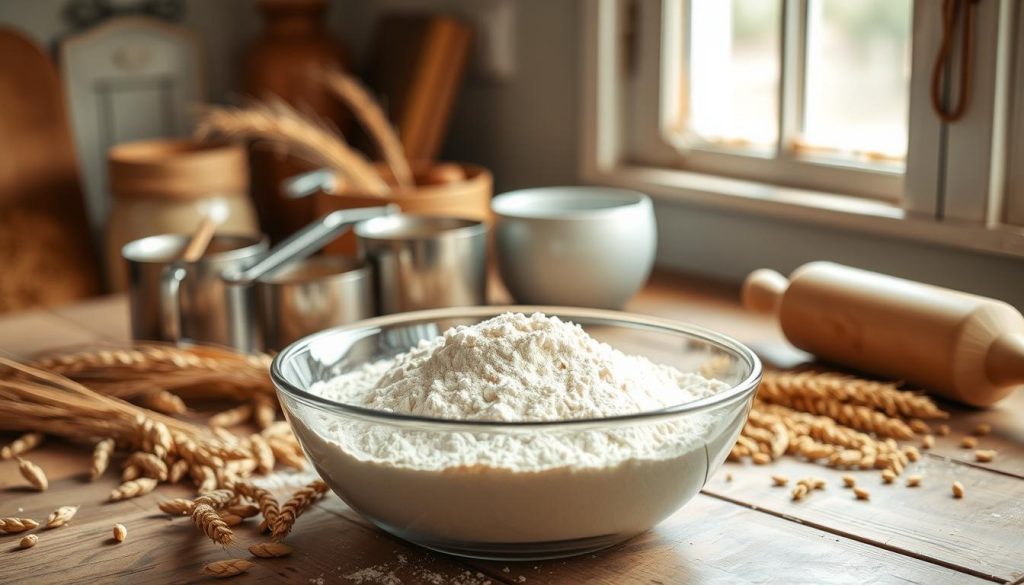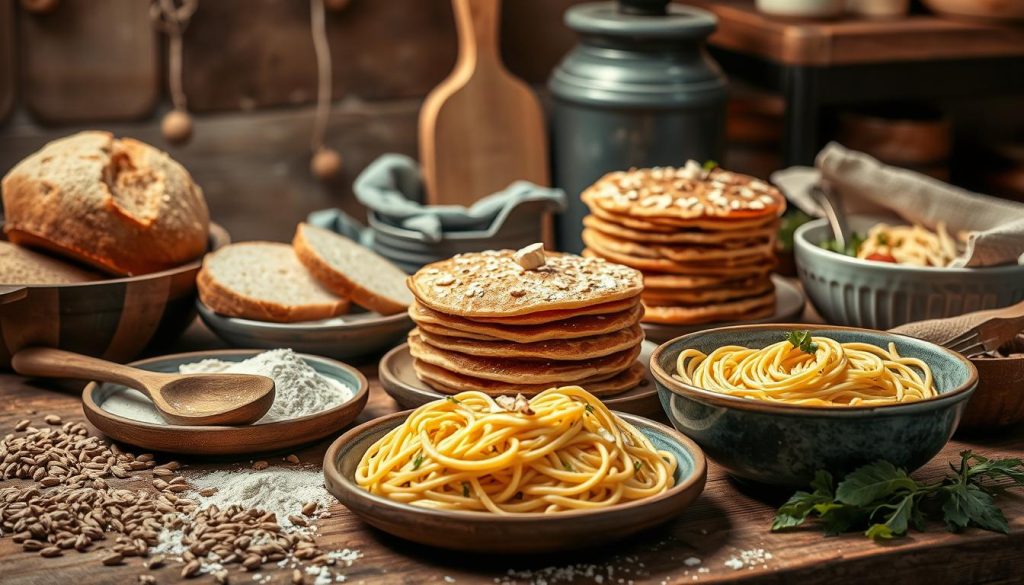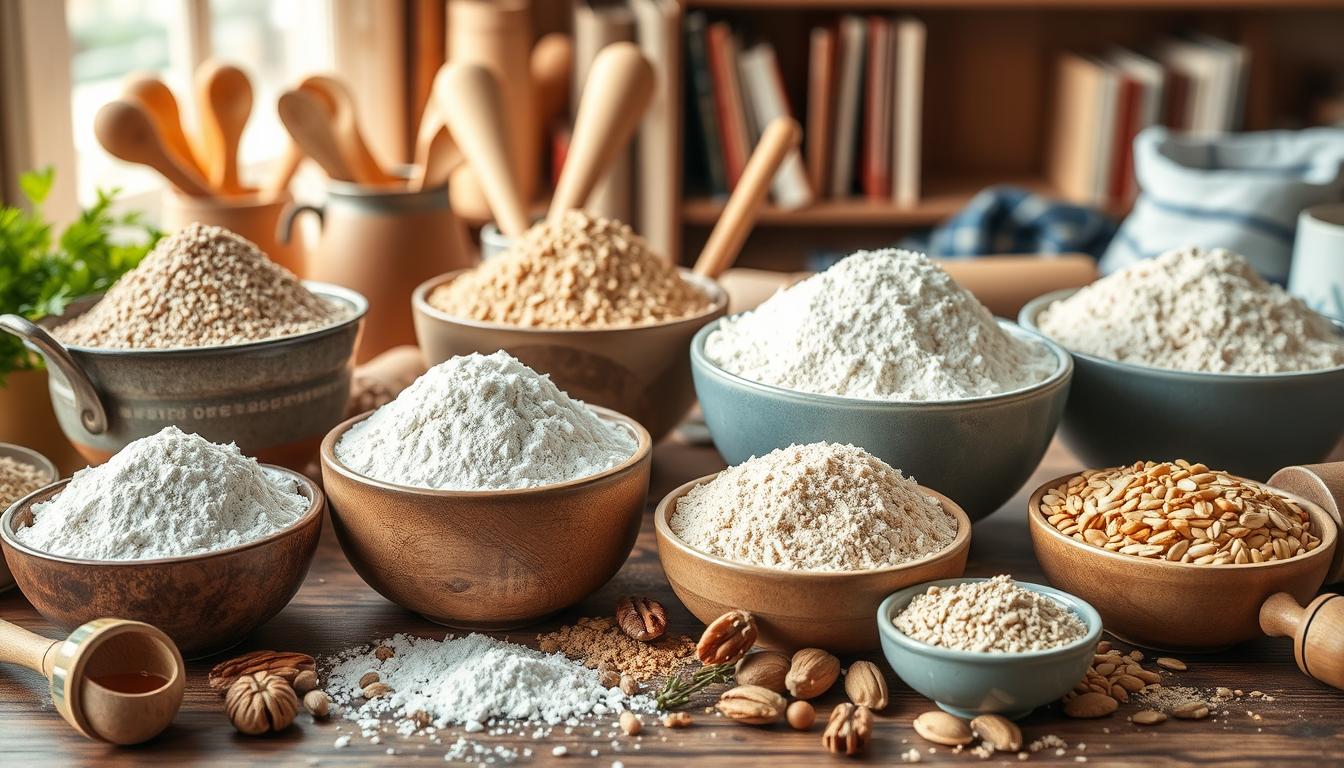Finding good substitutes for rye flour is key, whether you have dietary needs or can’t find rye flour. You might need help in your baking journey, with more people looking for healthy and varied recipes. This guide will show you the best options to bake without rye flour and keep your dishes tasty and textured.
Rye flour is loved for its distinct taste and health benefits. But, it has less gluten, making some bakes tricky. Also, studies show we need more fiber, as many Americans don’t get enough. Using the right substitutes can make your baked goods better and help you meet your fiber goals.
Understanding Rye Flour and Its Uses
Rye flour is a special ingredient known for its unique taste and health benefits. You might be curious about what rye flour is and how it’s different from other flours. It’s made from ground rye grain and has less gluten than wheat flour, making it denser.
The rye kernel has three parts: the endosperm, bran, and germ. Knowing this helps us understand why rye flour is good for us.
What Is Rye Flour?
Rye flour comes in different types based on the grain’s parts. White rye flour, or light rye, is just the endosperm. Medium rye flour has more bran, making it darker and tastier.
Dark rye flour can vary, with some brands keeping the whole grain. Pumpernickel flour, made from the whole kernel, is very dark and has a rich flavor. It’s perfect for sourdough and hearty bread.
Common Applications in Baking
Rye flour is great for both savory and sweet baked goods. Medium rye flour is a good all-around choice, balancing flavor and texture well. Here are some popular recipes:
- Rye bread
- Pumpernickel bread
- Rye crackers
- Hearty muffins
These recipes show how rye flour adds depth to different dishes. It’s also packed with fiber, vitamins, and minerals, making it a healthier choice than white flour.
| Type of Rye Flour | Protein Content | Ash Content | Moisture Content |
|---|---|---|---|
| White Rye | 6.5-8.5% | 0.00-1.00% | 13.5% |
| Medium Rye | 9.0-10.0% | 1.31-1.60% | 13.0% |
| Dark Rye | 12.0-14.0% | 2.00-3.00% | 11.0% |
| Pumpernickel | 9.0-10.5% | 1.61-1.80% | 14.0% |
Rye Flour Substitute Guide: Top Options Revealed
Looking for alternatives to rye flour? You have many great options. Each one has its own benefits for baking. Here are some popular choices to consider.
Whole Wheat Flour
Whole wheat flour is a great whole wheat flour substitute for rye. It has a similar nutritional profile. It keeps the bran and germ, which are high in fiber.
This makes it good for heart health. When using whole wheat flour instead of rye, use the same amount. But, your baked goods might be denser. You might need to add more liquid to your recipes.
Choosing whole wheat flour boosts the nutritional value of your baked goods.
Oat Flour
Oat flour is a top choice for its oat flour benefits. It has more protein and fiber than all-purpose flour. It also adds a mild, sweet flavor.
It’s perfect for baking with oat flour. When substituting oat flour for rye, use about 25% less. This works well in pancakes, muffins, and breads, giving them a great texture and taste.
Almond Flour
Almond flour is a gluten-free option full of nutrients. It’s great for both sweet and savory dishes. It’s rich in protein and healthy fats.
When using almond flour as a substitute in yeast-based recipes, replace 1/2 cup of almond flour for each cup of rye. For other recipes, try substituting about 25% of the flour with almond flour. This keeps the balance right.

| Flour Type | Nutritional Benefits | Substitution Ratio |
|---|---|---|
| Whole Wheat Flour | High in fiber, heart-healthy | 1:1 |
| Oat Flour | Higher protein and fiber, slightly sweet | 75% of rye flour |
| Almond Flour | Rich in healthy fats and protein | 1/2 cup per cup of rye or 25% |
Exploring Gluten-Free Alternatives
Looking for the right flour substitute can make baking fun, even with gluten-free options. We’ll look at coconut flour, chickpea flour, and rice flour. Each has its own benefits and uses in different recipes.
Coconut Flour
Coconut flour is packed with fiber and has a sweet taste. It’s great for gluten-free baking. But, you might need to change your recipes because it absorbs a lot of liquid.
Replacing 1/4 to 1/3 cup of coconut flour for every cup of rye flour works well. It’s perfect for moist treats like cakes and muffins. Remember, you’ll need more liquid and eggs to get the right texture. You can use coconut flour in pancakes, brownies, and gluten-free muffins.
Chickpea Flour
Chickpea flour is made from ground chickpeas. It has a nutty flavor and lots of protein and fiber. It’s great for savory dishes, like pizza crusts and flatbreads.
When using chickpea flour instead of rye flour, use about 25% less. This keeps the flavor and texture right. Chickpea flour recipes add depth and nutrition to your meals.
Rice Flour
Rice flour is a solid rice flour substitute for many recipes. You can use white or brown rice flour to replace rye flour. Brown rice flour is better because it’s full of fiber and nutrients.
When using rice flour, you usually don’t need to make big changes. Just swap 1 cup of rye flour with 1 cup of rice flour. Rice flour baked goods might be drier, but they’re still a favorite for gluten-free treats like cookies, cakes, and bread.
Additional Flour Alternatives to Consider
Exploring different flour alternatives can make your baking more exciting. Spelt, buckwheat, and teff flours are great for their unique tastes and health perks.
Spelt Flour
Spelt flour is an ancient grain that’s close to wheat. It has more protein and fiber than regular white flour. The benefits of spelt flour include better digestion and a nutty taste, which can make baked goods better.
You can replace rye flour with spelt flour in a 1:1 ratio. But, remember to add more water since spelt flour absorbs more.
Buckwheat Flour
Buckwheat flour is gluten-free and has a strong, earthy flavor. It’s packed with nutrients and versatile. When using buckwheat flour, you can mix it with rye flour up to 50%.
This flour is great in pancakes and baked goods, adding a unique taste and texture. You can find many gluten-free buckwheat recipes online.
Teff Flour
Teff flour comes from Ethiopia and is known for its fine texture and high protein and fiber. The benefits of teff flour include its gluten-free baking suitability. You can use it as a 1:1 substitute for rye flour, adding its special flavor to your recipes.
Teff flour is versatile and works well in gluten-free pancakes and bread. It’s a great choice for experimenting with new recipes.

| Flour Type | Protein Content (per cup) | Key Benefits | Substitution Tips |
|---|---|---|---|
| Spelt Flour | 16g | Higher fiber, digestibility | 1:1 for rye flour, adjust water |
| Buckwheat Flour | 15g | Gluten-free, nutrient-rich | Up to 50% substitution for rye |
| Teff Flour | 13g | High in protein, fiber | 1:1 for rye flour, distinct flavor |
Conclusion
Learning about the best rye flour substitutes can make baking more fun and inclusive. This article has shown you many options like whole wheat, buckwheat, spelt, and gluten-free flours. Each one adds its own taste and texture to your recipes.
For example, whole wheat flour can be used just like rye flour. Buckwheat flour is a great gluten-free choice, but it makes things a bit denser. Start by mixing in 25% of a new flour to get the right taste.
There are over 30 types of flour out there. Mixing different ones can lead to amazing dishes. So, whether you’re making a spelt loaf or rice pancakes, you can try new things and still have fun.
In short, knowing what each flour does can help you bake with confidence. You can make lighter loaves with spelt or fluffy pancakes with rice flour. So, go ahead and explore these options to make tasty new treats.
Source Links
- https://www.everydayhealth.com/diet-nutrition/alternative-flours-to-try-in-homemade-baked-goods/
- https://www.goodhousekeeping.com/uk/food/a32342691/flour-alternatives/
- https://www.kingarthurbaking.com/blog/2020/10/05/how-to-substitute-rye-for-all-purpose-flour
- https://www.kingarthurbaking.com/blog/2020/09/28/types-of-rye-flour
- https://theryebaker.com/rye-flour/
- https://www.seriouseats.com/the-best-flour-for-sourdough-starters-an-investigation
- https://www.alphafoodie.com/how-to-make-rye-flour-pumpernickel-flour/
- https://www.lifeextension.com/wellness/lifestyle/15-flour-alternatives?srsltid=AfmBOorq0Q-SsCHsi-GKvGvwBjGtDFrFzjkh7n4LoOt7YXcTO3WAGJ7W
- https://kbcbakery.com/baking-101-gluten-free-and-vegan-substitutes/
- https://welleasy.co.uk/blogs/health/guide-to-alternative-flour
- https://www.bhg.com/recipes/how-to/bake/flour-substitutes/
- https://foodtolive.com/healthy-blog/flour-guide-everything-you-need-to-know-about-different-types-of-flour/?srsltid=AfmBOoqKZUFxXdZ1i1w33i6x31pMnvVR_cGsrdjx5i9VeI2C1mRwZjlq
- https://bakeitwithlove.com/rye-flour-substitute/
- https://www.sweetandsavorybyshinee.com/types-of-flour/
